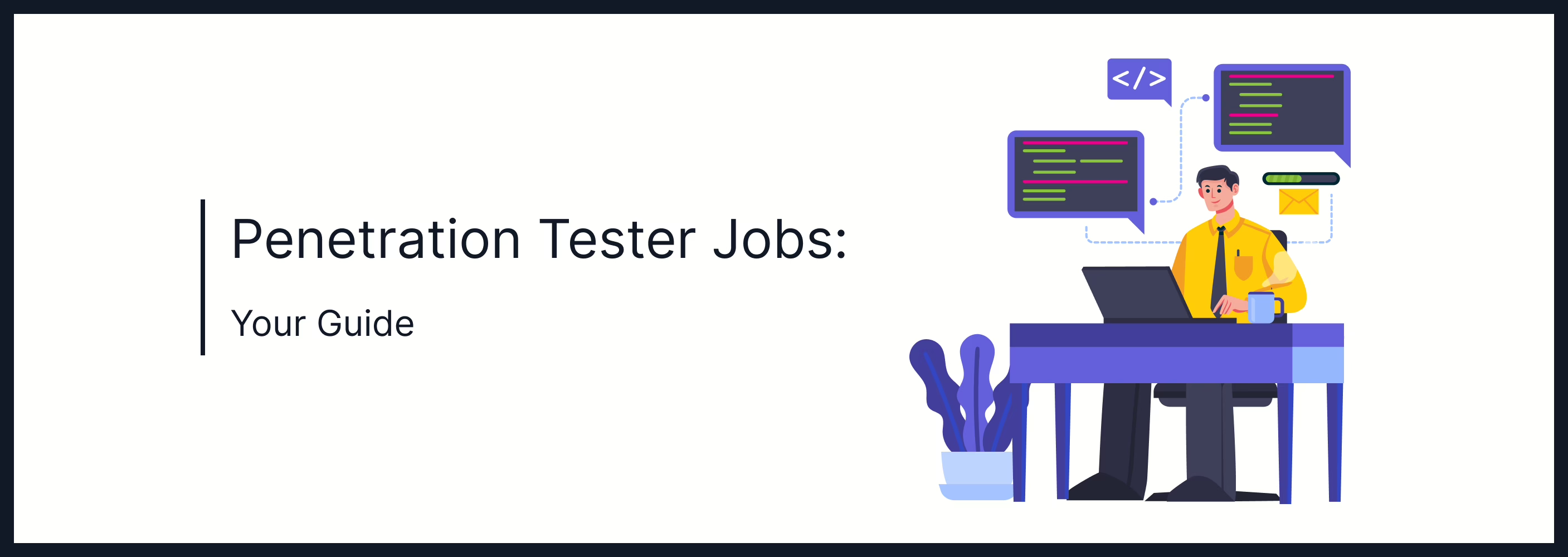
Oct 15, 2024 Information hub
Penetration Tester Jobs: Your Guide to a Thriving Career in Cybersecurity
In today’s digital age, cybersecurity has become a critical concern for businesses, governments, and individuals alike. With the increasing number of cyberattacks, data breaches, and sophisticated hacking techniques, organizations are more vulnerable than ever. This is where penetration testers, also known as ethical hackers, come into play. Penetration tester jobs are in high demand as companies seek to identify and fix vulnerabilities before malicious hackers can exploit them.
In this blog post, we will explore the world of penetration tester jobs, their relevance in today’s cybersecurity landscape, the skills required, current trends, challenges, and future developments. Whether you’re considering a career in penetration testing or are simply curious about the field, this comprehensive guide will provide valuable insights into this exciting and rewarding profession.
The Growing Relevance of Penetration Tester Jobs
Why Cybersecurity Matters More Than Ever
The digital transformation of businesses and the increasing reliance on technology have made cybersecurity a top priority. According to a report by Cybersecurity Ventures, cybercrime is expected to cost the world $10.5 trillion annually by 2025. This staggering figure highlights the urgent need for robust cybersecurity measures, including penetration testing.
Penetration testers play a crucial role in safeguarding organizations by simulating cyberattacks to identify vulnerabilities in systems, networks, and applications. By doing so, they help prevent data breaches, financial losses, and reputational damage. As cyber threats continue to evolve, the demand for skilled penetration testers is only expected to grow.
The Role of a Penetration Tester
Penetration testers, often referred to as “pentesters,” are cybersecurity professionals who use their technical expertise to assess the security of an organization’s digital infrastructure. Their primary goal is to identify weaknesses that could be exploited by malicious hackers. Penetration testers use a variety of tools and techniques to simulate real-world attacks, including:
- Network Penetration Testing: Assessing the security of an organization’s network infrastructure, including firewalls, routers, and switches.
- Web Application Penetration Testing: Identifying vulnerabilities in web applications, such as SQL injection, cross-site scripting (XSS), and insecure authentication mechanisms.
- Social Engineering: Testing an organization’s human defenses by attempting to manipulate employees into revealing sensitive information or granting unauthorized access.
- Wireless Penetration Testing: Evaluating the security of wireless networks to prevent unauthorized access or data interception.
By identifying and addressing these vulnerabilities, penetration testers help organizations strengthen their defenses and reduce the risk of cyberattacks.
Skills and Qualifications for Penetration Tester Jobs
Technical Skills Required for Penetration Testing
Penetration tester jobs require a unique blend of technical expertise and problem-solving skills. Some of the key technical skills that aspiring penetration testers should possess include:
- Networking Knowledge: A deep understanding of networking protocols (TCP/IP, DNS, HTTP, etc.) is essential for identifying vulnerabilities in network infrastructure.
- Operating Systems: Proficiency in both Windows and Linux operating systems is crucial, as penetration testers often need to exploit weaknesses in these environments.
- Programming and Scripting: Knowledge of programming languages such as Python, JavaScript, and C++ is valuable for writing custom scripts and automating tasks. Scripting languages like Bash and PowerShell are also commonly used in penetration testing.
- Vulnerability Assessment Tools: Familiarity with popular penetration testing tools such as Metasploit, Nmap, Burp Suite, and Wireshark is essential for conducting thorough assessments.
- Cryptography: Understanding encryption algorithms and cryptographic protocols is important for identifying weaknesses in data protection mechanisms.
Soft Skills and Personal Attributes
In addition to technical skills, penetration testers must possess certain soft skills and personal attributes to excel in their roles:
- Problem-Solving: Penetration testers need to think like hackers and find creative ways to exploit vulnerabilities. Strong problem-solving skills are essential for identifying and addressing security weaknesses.
- Attention to Detail: Cybersecurity is a field where even the smallest oversight can have significant consequences. Penetration testers must be meticulous in their assessments to ensure no vulnerabilities are overlooked.
- Communication Skills: After conducting a penetration test, testers must communicate their findings to stakeholders, often in non-technical terms. Strong communication skills are essential for conveying complex information clearly and effectively.
- Ethical Mindset: Penetration testers must adhere to strict ethical guidelines, as they are entrusted with sensitive information and access to critical systems. Integrity and professionalism are paramount in this role.
Certifications for Penetration Tester Jobs
Certifications are an important way for penetration testers to demonstrate their expertise and credibility. Some of the most recognized certifications in the field include:
- Certified Ethical Hacker (CEH): Offered by the EC-Council, the CEH certification is one of the most popular credentials for penetration testers. It covers a wide range of topics, including network security, cryptography, and social engineering.
- Offensive Security Certified Professional (OSCP): The OSCP certification, offered by Offensive Security, is highly regarded in the industry. It requires candidates to complete a hands-on penetration test and submit a detailed report of their findings.
- Certified Information Systems Security Professional (CISSP): While not specific to penetration testing, the CISSP certification is a valuable credential for cybersecurity professionals. It covers a broad range of topics, including security architecture, risk management, and incident response.
- GIAC Penetration Tester (GPEN): Offered by the Global Information Assurance Certification (GIAC), the GPEN certification focuses on network penetration testing and ethical hacking techniques.
Current Trends in Penetration Tester Jobs
The Rise of Automated Penetration Testing
As cyber threats become more sophisticated, organizations are increasingly turning to automated penetration testing tools to complement manual testing efforts. Automated tools can quickly scan networks and applications for known vulnerabilities, allowing penetration testers to focus on more complex and targeted attacks.
However, while automation can enhance efficiency, it cannot replace the creativity and critical thinking that human penetration testers bring to the table. Automated tools are limited to identifying known vulnerabilities, whereas skilled penetration testers can uncover novel attack vectors and exploit weaknesses that may not be detected by automated systems.
The Growing Importance of Cloud Security
With the widespread adoption of cloud computing, penetration testers are increasingly tasked with assessing the security of cloud environments. Cloud platforms such as Amazon Web Services (AWS), Microsoft Azure, and Google Cloud offer unique security challenges, including misconfigured storage buckets, insecure APIs, and inadequate access controls.
Penetration testers must stay up-to-date with the latest cloud security best practices and tools to effectively assess cloud-based infrastructure. As more organizations migrate to the cloud, the demand for penetration testers with cloud expertise is expected to rise.
The Impact of Remote Work on Cybersecurity
The COVID-19 pandemic has accelerated the shift to remote work, creating new cybersecurity challenges for organizations. Remote work environments often rely on virtual private networks (VPNs), cloud-based collaboration tools, and personal devices, all of which can introduce security vulnerabilities.
Penetration testers are increasingly being called upon to assess the security of remote work setups, including VPN configurations, endpoint security, and secure access to corporate resources. As remote work becomes a permanent fixture in many industries, penetration testers will play a critical role in ensuring the security of distributed workforces.
Challenges in Penetration Tester Jobs
Keeping Up with Evolving Threats
One of the biggest challenges for penetration testers is staying ahead of the ever-evolving threat landscape. Cybercriminals are constantly developing new attack techniques, and penetration testers must continuously update their knowledge and skills to remain effective.
To address this challenge, penetration testers must engage in continuous learning, attend industry conferences, participate in Capture the Flag (CTF) competitions, and stay informed about the latest vulnerabilities and exploits.
Balancing Security and Business Needs
Penetration testers often face the challenge of balancing security recommendations with business needs. While a penetration test may reveal critical vulnerabilities, implementing all recommended security measures may not always be feasible due to budget constraints, operational requirements, or other business considerations.
Penetration testers must work closely with stakeholders to prioritize vulnerabilities based on risk and impact, ensuring that the most critical issues are addressed without disrupting business operations.
Future Developments in Penetration Tester Jobs
The Integration of Artificial Intelligence (AI)
Artificial intelligence (AI) is poised to play a significant role in the future of penetration testing. AI-powered tools can analyze vast amounts of data, identify patterns, and detect anomalies that may indicate security vulnerabilities. These tools can also simulate sophisticated attacks, helping penetration testers identify weaknesses that may not be apparent through traditional methods.
While AI has the potential to enhance penetration testing, it is unlikely to replace human testers entirely. The creativity, intuition, and problem-solving abilities of human penetration testers remain essential for identifying complex and novel attack vectors.
Increased Focus on IoT Security
The proliferation of Internet of Things (IoT) devices presents new security challenges for organizations. IoT devices, such as smart cameras, sensors, and industrial control systems, are often vulnerable to cyberattacks due to weak security configurations and limited processing power.
Penetration testers will need to develop specialized skills to assess the security of IoT devices and networks. As IoT adoption continues to grow, the demand for penetration testers with expertise in IoT security is expected to increase.
Benefits of Pursuing a Career in Penetration Testing
High Demand and Job Security
Penetration tester jobs are in high demand, and this trend is expected to continue as cyber threats become more prevalent. According to the U.S. Bureau of Labor Statistics, employment in the information security field is projected to grow 33% from 2020 to 2030, much faster than the average for all occupations. This growth translates to strong job security and numerous career opportunities for penetration testers.
Competitive Salaries
Penetration testers are well-compensated for their expertise. According to PayScale, the average salary for a penetration tester in the United States is approximately $87,000 per year, with experienced professionals earning well over $100,000 annually. Salaries can vary based on factors such as location, experience, and certifications.
Continuous Learning and Growth
Penetration testing is a dynamic and ever-evolving field that offers continuous learning opportunities. As new technologies and threats emerge, penetration testers must stay up-to-date with the latest tools, techniques, and best practices. This constant learning makes penetration testing an intellectually stimulating and rewarding career.
Conclusion
Penetration tester jobs are at the forefront of the cybersecurity industry, playing a critical role in protecting organizations from cyber threats. As businesses continue to digitize and cyberattacks become more sophisticated, the demand for skilled penetration testers will only increase.
To succeed in this field, aspiring penetration testers must develop a strong foundation in technical skills, stay informed about the latest trends and threats, and pursue relevant certifications. While the challenges in penetration testing are significant, the rewards—both in terms of job satisfaction and compensation—make it a highly attractive career path.
For those passionate about cybersecurity and problem-solving, penetration testing offers a unique opportunity to make a meaningful impact in the fight against cybercrime. Whether you’re just starting your career or looking to advance in the field, penetration tester jobs offer a promising and fulfilling future.
Actionable Takeaways:
- Develop Technical Skills: Focus on networking, operating systems, programming, and vulnerability assessment tools.
- Pursue Certifications: Consider certifications like CEH, OSCP, and GPEN to enhance your credibility.
- Stay Informed: Keep up with the latest cybersecurity trends, tools, and threats through continuous learning.
- Gain Hands-On Experience: Participate in CTF competitions, internships, or freelance projects to build practical skills.
- Network with Professionals: Join cybersecurity communities, attend conferences, and connect with industry experts to expand your knowledge and opportunities.
By following these steps, you’ll be well on your way to a successful career in penetration testing.
